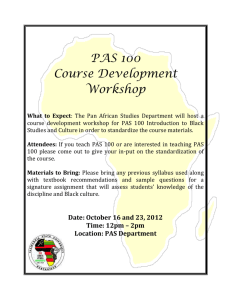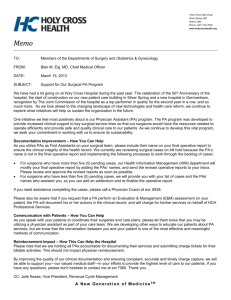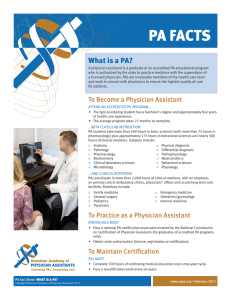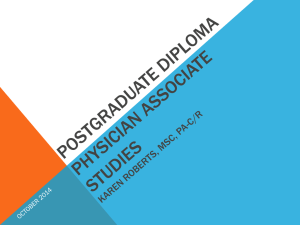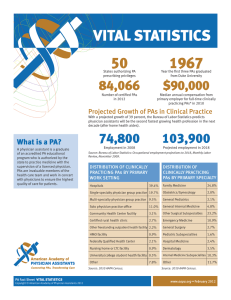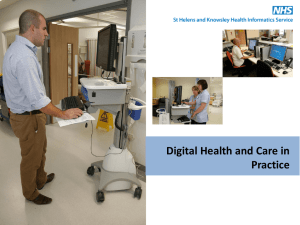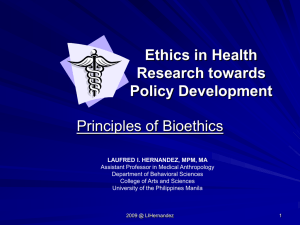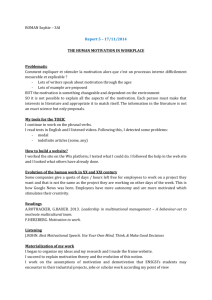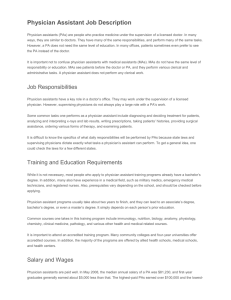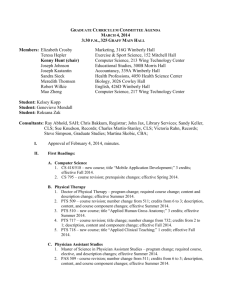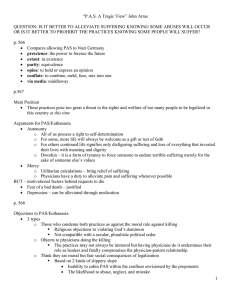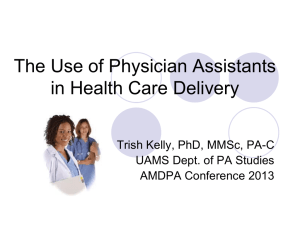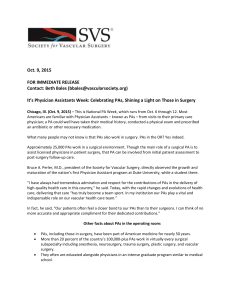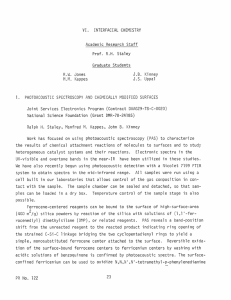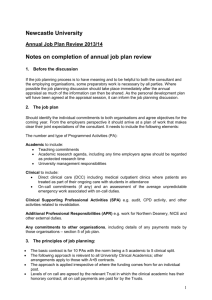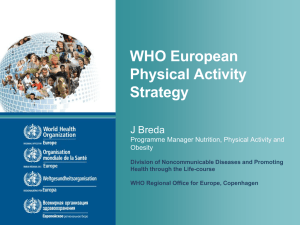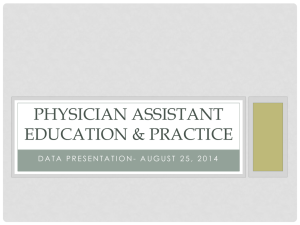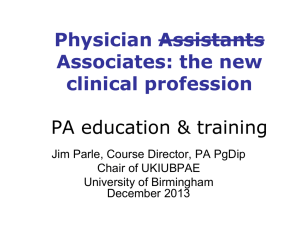Physician Associates - Health Education Yorkshire and the Humber
advertisement
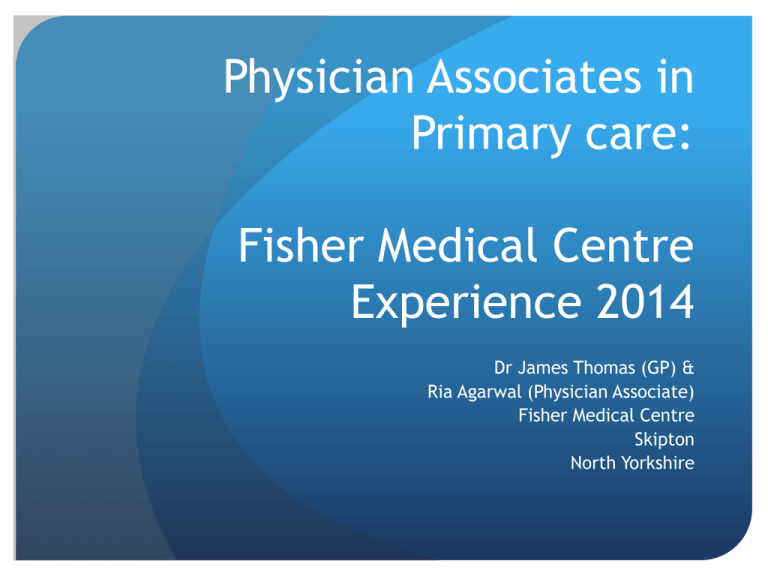
Physician Associates in Primary care: Fisher Medical Centre Experience 2014 Dr James Thomas (GP) & Ria Agarwal (Physician Associate) Fisher Medical Centre Skipton North Yorkshire PAs in Primary Care Fisher Medical Centre 2013 Partnership of 14K patients Semi -Rural Practice/ Own building / in house pharmacist / 30 Admin staff. 7 FTWE GPs 9 Partners and 1 Salaried doctor 5 PNs 3 HCAs No ANPs Teaching practice- medical students, FY and GPRs and GP returners. High QOF achievers Why the need for PAs? 2013 Retirement of partners leaving 11 clinical sessions to be covered. Poor response to Salaried GP advert. Reducing income. Increasing workload. Managing partner’s expectations work-life balance Innovation Next steps: What did we do ? Outcome: Different models of working. Employed 3 FTWE PAs Band Low 7-low 8. Information on PAs and ANP: Partner experience/USA/ Aberdeen. Contacted and met with SGUH PA course director. Advertised for PA and APN Assessed and meet the challenges and Barriers. 2 from SGUL (Just Qualified) 1 from Alaska USA (15 years experience) Implemented change within the organisation and for the patients and community. MEET THE PA TEAM @ FMC What are these Physician Associates?!?! “a new healthcare professional, who, while not a doctor, works to the medical model, with the attitudes, skills and knowledge base to deliver holistic care and treatment within the general medical and/or general practice team under defined levels of supervision” (DOH Competence and curriculum framework) Ria Agarwal Fisher Medical Centre How are we trained? PG Dip: diverse backgrounds and ages; 21-43yrs old! Ex nurses, ex radiologists, Biomedical science graduates OSCE- style interview following personal statement and reference checks: In 2011 there were 200+ applicants for 24 seats Generally taught by GPs or GP PA’s Small cohort size: interactive teaching Courses currently in London, Birmingham, Aberdeen, and due to start in Plymouth/Peninsula 100% employment rate Assessments/training based on DOH Competence Framework for Physician Associates 1st year: 1st year: Theory+ prep for 2nd year: 9-5 and homework! -Anatomy and Physiology (revision for most!) -Pharmacology (100 medications and 15 prescribing guidelines e.g. hypertension, dyspepsia, depression, diabetes, warfarin) -Foundations of Clinical Medicine (disease) -OSCE skills: history taking, examination, 20 explanation stations e.g. hypertension, antidepressant initiation, contraceptive pill initiation -Evidence based Practice; analysing papers -PBL for consolidation of learning weekly GP attachment; 120+ hours in first year (1 day weekly) and 180+ hours in 2nd year (6 weeks full time) Initially shadowing a GP then seeing patients with GP supervision 2nd year: new levels of exhaustion! Hospital rotations e.g. General Medicine (180 hours), AMU (180 hours), Mental Health (90 hours), Paeds (90 hours), Surgery (90 hours), A&E (180 hours), Obs and Gynae (90 hours), plus electives (3x 90 hours each) e.g. ENT, Dermatology. Total 1650 hours which exceeds DOH criteria. Then back to GP for 180 hours Special topics week to kick it off: taught by current PA’s for the students Professional Development Portfolios: learning and development reviews from placements, case histories, reflections from challenging cases, PBL feedback, multi-source feedback, DOPS, hours sheetsreviewed One day every 3 weeks at University for tests, revision classes for exams, mock OSCEs National Exam upon graduation: OSCE + 200 MCQs, MCQs to be repeated every 6 years (recertification) to re-test broad knowledge Portfolio paperwork example- essential DOPS What do other PA’s do? Our cohort of 18 6 GP PA’s 3 PA interns on hospital rotations 1 Research PA 1 Haematology PA 1 IBD clinic PA 2 Orthopaedics PA 1 Neurology PA 1 A and E PA 1 AMU PA 1 Paeds PA SGUL Pas more keen for primary care as keeping up with broad knowledge and skills, but not enough jobs Annual census to keep track of which professions PA s are in What do we do at FMC? Work in a Same Day Service system- Book on the day All 3 PAs Work with one GP. GP Triaging calls whilst working with PAs PAs now see 21 appointments per day each, equivalent to 315 appointments per week / 15120 per annum. Previous GP appointments were equivalent to 165 per week, or 7260 per annum. A proportion pre bookable. Telephone consultations. Review of investigations and correspondence. What don’t they see and do? We decided to look at what they shouldn’t see E.g. <6/12, pregnant, complex patients, severe mental health problems.- but safety net in place. They do not prescribe. They can not organise radiological investigations apart from USS. What do they do? BREATH OF FRESH AIR!! Extended arm of the GP Manage most straight forward patients and more! Arrange further investigations were appropriate and to work cases up who then are reviewed by their own GP. Work well with other clinical staff- ecgs, dopplers, ecg etc. Referral – Non elective and Elective after discussion with GP. Developed roles with ACP. Contribute to educational meetings Keeps the GP up to date by questioning your management plan. Opportunities with the PA role in Primary care: Multitude of roles in primary care: Book on the day Chronic Disease ACP Visiting Work patients up to see GP Collaborative care role Excellent team working skills Develops leadership skills within the team Teaching opportunities Next steps: Employed a further PA to work with a ANP for a collaborative project between a group of practices. This is an initiative from a partnership with health and social care to look at ACP in care homes and training care home staff. Look at their role in extended hours. Developed links with the PPG and NAPP. Develop links with HEYH/ Workforce group. Develop their role in primary care and look at recruitment for further projects and training. Submitted a research project for Health Foundation Project to evaluate their role in primary care. So what have we found so far? Change management is vital with all stakeholders: in house/ patients/ organisations/press etc... Yes it was a risk but the climate forced it. Their training needs to involve primary care from the start to ensure they consider primary care – do not make the same mistakes we have done in the past with primary care training of health professionals, given the current shift in care to primary care. They are part of a team and part of a solution with workforce but not alone. They should not be seen as a threat to professions- GPs/ APNs HCAs etc. they compliment us all. And… THEY ARE GOOD! Clinically. Communication skills. Patient feedback has been very positive. They are productive- appointments numbers and cost. Fitted into the Primary care team easily. Willingness to learn and develop skills. Supportive to the team. “The physician assistant role has been an overwhelming success in the United States. There is no reason why it could not be so here, given good will and the desire to see it succeed.5 My own research among general practitioners clearly indicates that they would regard physician assistants as a welcome addition to the primary care team.” THANK YOU Any Questions? Contact Details: Fisher Medical Centre Skipton North Yorkshire 01756 799622 jamesthomas2@nhs.net
